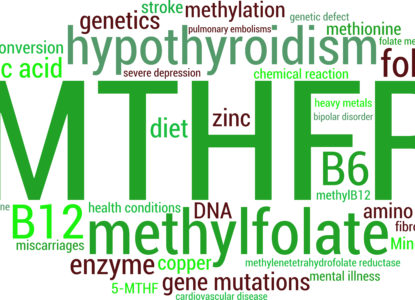Why an MTHFR Eating Plan Isn’t Necessary

Contents
Maybe you just learned that you have genetic variants in the MTHFR genes that impact B vitamin metabolism and your hair is on fire doing Google research to determine what you should do next.
Should you follow an MTHFR specific diet plan?
As the creators of one of the best DNA based nutrition algorithms on the market today, that’s a question we get with some regularity at Gene Food. The answer is no, and for a simple reason. You can’t tailor your entire diet to genetic variants that are carried by 30-40% of the general population.
However, read on, because there are some steps you can take to optimize nutrition if you carry MTHFR polymorphisms.
Note: while we don’t recommend basing nutrition decisions on one gene, we do believe testing for MTHFR variants is worthwhile, especially for the Black community where these variants are far less common.
MTHFR variants are common
Unfortunately, the conversations surrounding the MTHFR gene have taken front and center in nutrigenomics conversations for a number of years now.
I say unfortunately, because the claims made about commonly held variants MTHFR C677T and MTHFR A1298C have outpaced the scientific research, and there are much more interesting topics to cover in the personalized nutrition space than MTHFR.
In our Guide to Genetics and Nutrition, Dr. Aaron Gardner estimates that about 30% of the population carry at least one copy of either MTHFR A1298C or MTHFR C677T.
In fact, MTHFR variants are so common that the CDC discourages use of the word “mutation” when referring to MTHFR because the CDC believes gene mutations should describe changes to genes that are “much less common.” For the rest of this post, we will use “SNP” and variant interchangeably. A single nucleotide polymorphism or “SNP” is a small change to a gene that alters function.
MTHFR impacts B vitamin metabolism
This isn’t to say that MTHFR variants have no impact.
Changes to the MTHFR genes impact on the way we metabolize B vitamins, especially folate and folic acid. In previous writings, I had this to say about the importance of MTHFR in folate metabolism on our MTHFR science page:
MTHFR forms part of the one carbon pathway which is responsible for converting folate and folic acid into a variety of precursor products which are used to synthesize new DNA, RNA and other amino acids; process which are vital for the cell maintenance and also the production of new, healthy cells.
Keep in mind that just because some MTHFR variants result in diminished ability to metabolize folate and folic acid, it does not follow that the function drops down to zero.
Even those of us with MTHFR variants can still metabolize some folic acid, which is why the CDC still recommends that pregnant mothers take folic acid, even in the presence of MTHFR SNPs.
Is there an MTHFR diet plan?
No, there isn’t an MTHFR diet plan, despite what you may have heard.
Why not?
Because the variants are too common, and the nutrition advice (eat more leafy greens rich in folate) applies universally.
The future of DNA diets is in genetic risk scoring (also called polygenic risk scoring), not single gene (or in this case “SNP”) analysis. The human genome contains an estimated 30,000 genes, we can’t base dietary decisions on single, and very common, genetic variants. As John wrote in his piece on whether DNA diets work, the best way to tailor diet to DNA is to pool a number of genes that impact on a topic like cholesterol absorption, or methylation, and then score people comprehensively looking for predispositions. We do use MTHFR variants in the methylation scoring section of our nutrition plans, but MTHFR SNPs account for only 20% of the genes we look at. Other genes we evaluate for methylation:
In other words, you can carry an MTHFR variant and still have good methylation.
Single gene analysis vs. risk scores
On its page about polygenic risk scores, The National Human Genome Institute does a fantastic job of explaining the difference between single gene vs. complex diseases. There are conditions like cystic fibrosis which are determined by a single genetic mutation. Scientists have identified the mutation and know that it leads to disease. However, complex diseases, like heart disease, are multi-factorial. While some of us have genetic risk for heart disease, we can’t pin the condition on any one gene. Instead, we look at a host of different factors, including multiple genes known to increase heart disease risk in certain populations. MTHFR status can play a role in methylation and B vitamin metabolism, but there is no association between MTHFR and any one condition, as we see with cystic fibrosis. Yes, MTHFR status can play a role in B vitamin deficiency, but it is only one of many factors.
How MTHFR can impact nutrition decisions
If you want to tailor diet and nutrition decisions to your MTHFR status, there are some conservative steps you can take.
The first is to make sure you are getting enough folate in your diet. Of course, this is sound nutrition advice regardless of whether you carry an MTHFR polymorphism as the public at large is deficient in B vitamins. However, leafy greens, broccoli, brussel sprouts, chickpeas, and even small portions of liver all contain meaningful amounts of folate. With the exception of liver, which should be eaten only on occasion, it’s next to impossible to overdose on folate rich foods, so if you want to support methylation because of what could be diminished MTHFR capacity, eat your greens at every meal.
However, the CDC acknowledges that it can be difficult to get the necessary amount of folate from food alone.
As such, and because reduced folate metabolism doesn’t equal zero metabolism, the government still recommends pregnant women take folic acid supplements to prevent neural tube defects.
If you’re not pregnant and have an MTHFR variant you would like to support beyond just eating a folate rich diet, a good B complex supplement with methylfolate could be an option to discuss with your physician. There is emerging evidence that methylfolate supplements have the potential help those with MTHFR variants who suffer from depression. A 2013 meta-analyses of 26 studies found a link between MTHFR C677T and depression, especially in Asian populations. We do have one study to point to which saw improvements in mental health for patients given 15 mg/day of methylfolate in addition to selective serotonin reuptake inhibitors (SSRIs), a class of drugs commonly prescribed to treat depression.
See also: How to choose a healthy B vitamin dose
MTHFR and vegan diets
You may have heard that vegan diets and MTHFR variants don’t mix, but this simply isn’t true. Dr. Joel Kahn is a cardiologist and nationally recognized expert on plant based nutrition who has appeared in films like What the Health and on nationally syndicated TV shows like The Doctors. We have had Dr. Kahn on the podcast several times, so we asked his opinion on whether vegan diets are compatible with MTHFR SNPs. He had this to say:
The importance of methylation for health is well recognized and requires adequate vitamins (B12, Folate). A poorly planned vegan diet could be deficient in these nutrients and could impair methylation and raise homocysteine. I recommend either checking blood levels, supplementing, or both to insure optimal health.
We’ve written about nutrient deficiency on vegan and vegetarian diets several times in the past, and it’s a real issue. For interested readers, here are some topics to look into:
- Vitamin A and Vegan Diets
- The Vegan Omega-3 Problem
- Getting Enough Vitamin B12 on Vegan and Vegetarian Diets
- Getting Enough Iron on a Plant Based Diet
However, an MTHFR variant, standing alone, isn’t a reason to abandon a vegan diet, especially if you have chosen to go plant based for ethical reasons. Again, these SNPs are just too common and we can’t base entire diets on single genes.
Having said that, there is a blood test both vegans and omnivores can run to determine whether they are having metabolic issues due, in part to an MTHFR SNP: homocysteine. One of the ways physicians like Dr. Kahn determine if an MTHFR variant is causing trouble is by testing homocysteine, an amino acid metabolite in the blood that is linked to increased risk for poor cardiovascular health.
Summary
MTHFR variants, while common, do play an important role in methylation. If you carry copies of MTHFR variants, consider working with a doctor to test for high homocysteine. While elevated homocysteine isn’t only attributable to genetics, it can be a sign that you are having issues with B vitamin metabolism. While there is no science based reason to change your diet based on one gene, carriers of MTHFR SNPs can choose to eat a folate rich diet and may want to supplement with folate as well.
During pregnancy, the CDC recommends supplementing with folic acid regardless of MTHFR status. Outside of pregnancy, some carriers of MTHFR SNPs may find benefit in small doses of methylfolate, especially Asian Americans suffering from depression.



